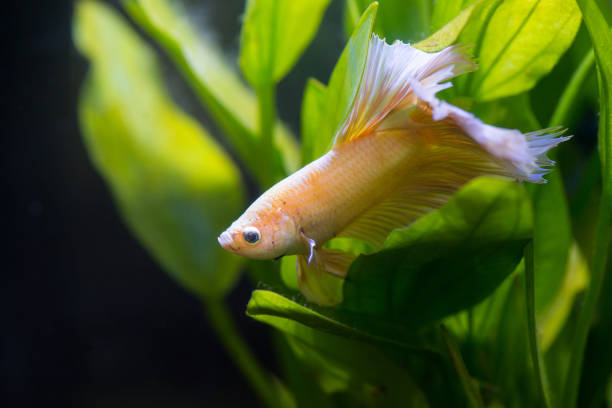Why Do Betta Fish Sleep a Lot: Common Causes and Sleeping Patterns
Betta fish are a popular fish in the aquarium hobby, but many people are still unaware of why bettas sleep so much. While there is no one answer to this question, there are several reasons why bettas may sleep for long periods of time.
One reason bettas may sleep a lot is that they need to conserve energy. Betta fish have small brains and bodies, so they need to conserve energy to stay healthy and active. When they’re resting, they’re conserving energy by slowing their heart rate and blood flow, which helps them stay cool and protect their organs. Another reason bettas may sleep a lot is that they’re social animals. When it’s time for them to rest or swim in their own space, they may need to do so with other bettas in the tank. When they’re sleeping, they’re conserving energy by calming down and shutting off their brain. This allows them to conserve energy for when it’s time for a social interaction again.

Table of Contents
What Does It Mean if Your Betta Fish Sleeps Too Much?
Betta fish are often kept in small, confined spaces and as a result, they often become exhausted. When a betta fish sleeps too much, it can mean that it is not getting the rest it needs and is, therefore, more prone to health problems. Bettas that sleep a lot may also be less active and may not interact with their surroundings as much.
Insufficient Light in the Aquarium
If you have a betta fish in a tank that is too dark, it may be sleeping more than usual. Betta fish need at least 8 to 12 hours of light per day to stay healthy and active. If your tank is too dark, it may be keeping your betta fish from getting the amount of light it needs.
No Activity in the Aquarium
If your tank is too boring for your betta fish, you may want to consider adding some live plant ornaments. Live plants provide a natural source of oxygen and shade for your fish, and can also serve as a hiding place for them when they feel threatened. Additionally, adding some colorful ornaments to your tank can make it more exciting for your fish and help to keep them stimulated.
Unstable Aquarium Temperature
If your bettas are sleeping a lot, it could be because their tank is too hot or cold. Bettas are tropical fish and prefer warm water temperatures between 75 to 80 degrees Fahrenheit (23.8-26.6 degrees Celsius). If the water in their tank is too cold, they may become lethargic and sleep a lot to keep warm. If the water in their tank is too hot, they may become irritable and also sleep a lot to cool off. It is important to check the temperature of your bettas’ tank frequently and make any necessary adjustments as needed.
Sickness or Disease
Most betta fish owners will tell you that their betta fish is sleeping a lot. This can be a sign of illness, and it’s important to diagnose the problem as soon as possible. Some common reasons why your betta may be sick are lack of food or water, parasites, and viral infections. If you notice any changes in your fish’s behavior or appearance, it’s important to take him to the vet for a check-up.
Old Age
Betta fish are often kept as pets in many households, but they can also be found in many public aquariums. Bettas have a lifespan of 2-5 years but can live up to 7 years if properly cared for. Bettas do not require a lot of care when young, but as they age their natural behavior changes and they may begin to sleep more. Sleeping is a natural behavior for bettas and is not indicative of any health problems. Bettas will wake up quickly when they need to feed or when they feel threatened and should be treated the same as any other fish.
High Ammonia Levels
Ammonia is a chemical that is produced by the betta fish when they digest food. Ammonia levels can increase when your Betta fish eats small food items or if he’s fighting with another fish in his tank. When ammonia levels are high, Bettas start to sleep more and will also lose their appetite. If you notice that your betta fish is getting tired or eating less, it might be best to take him to a vet to have his ammonia levels checked.
Stress
If your betta fish is stressed out or has a disease, he might start to sleep more. If you’re not sure if your betta fish is feeling stressed, try giving him some specialized betta fish vitamins or supplements. You can also try changing his water and tank environment in an attempt to improve his conditions.
How Can You Tell if a Betta Fish Is Sleeping?
Betta fish are tropical fish that typically spend most of their time swimming around and eating. However, some betta fish will sleep for extended periods of time. There are a few ways to tell if a betta fish is sleeping: their body may be relaxed and they may not be moving around as much, they may have closed eyes, or they may have a slightly open mouth.

Sleeping Patterns of Betta Fish
Do Betta Fish Sleep on Their Sides?
Betta fish sleep a lot, which is why it is so important to have a good tank setup for them. Bettas will sleep on their sides in the water, and they will also sleep on the bottom of the tank. This is a sign that they are comfortable and happy. Betta fish sleep a lot, which is why they are often called “sleepy fish.” Some experts say that betta fish sleep in this position to conserve energy.
Do Betta Fish Sleep on the Bottom of the Aquarium?
Betta fish sleep a lot. Some people think that this is because they are cold-blooded and need to conserve energy, but others believe that it is because betta fish like to relax in a calm environment. It is also possible that betta fish sleep so much because they are used to sleeping in small spaces.
Do Betta Fish Sleep on Leaves?
Betta fish are tropical fish that typically live in small groups. Some betta fish will sleep on leaves to stay cool. When the temperature is too hot for betta fish to stay healthy, they will sleep on leaves to lower their body temperature.
How Else Do Bettas Sleep?
Betta fish are known for their sleeping habits. Bettas will often sleep for up to 18 hours at a time, which is more than any other fish species. Bettas use this time to rest and digest their food. Bettas also spend most of their time stationary. Betta fish will come out of hiding and quickly dart back into hiding, which can be a sign that they may want to sleep or are frightened by something in the tank.
Do Betta Fish Hibernate?
Betta fish are tropical fish that are commonly kept in home aquariums. Bettas are active and playful fish, but they can also be quite lazy. Some people believe that bettas sleep a lot because they are naturally tired after spending hours swimming around in their tanks. Bettas do not hibernate, but they may sleep more than usual because they are comfortable and happy in their home aquarium.
Do Betta Fish Need Darkness to Sleep?
Betta fish are tropical fish that commonly live in water with a temperature of 75-80 degrees Fahrenheit (23.8-26.6 degrees Celsius). They are able to regulate their body temperature through the use of their fins and scales. When the water temperature is above 82 degrees Fahrenheit, they will seek refuge in cooler areas of the aquarium or sleep. Betta fish do not need darkness to sleep as they are able to do this during the day when the light levels are low.
How Long Should a Betta Fish Sleep for?
A good rule of thumb is to give your betta fish around 12 hours of sleep per day. Bettas should not be kept in tanks that are too small as they will become stressed and may sleep more than usual. Bettas are active fish and need to be kept active by being given plenty of swimming space and toys to play with.